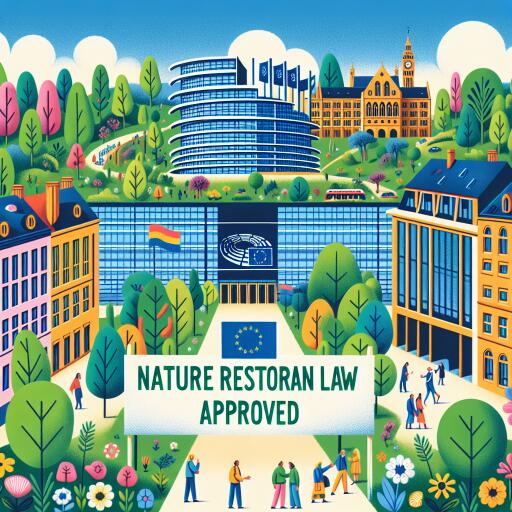
European Parliament Gives Green Light to Revolutionary Nature Restoration Legislation
In a landmark move for environmental conservation and restoration, the European Parliament has voted to adopt a groundbreaking Nature Restoration Law, aiming to revitalize a significant portion of the continent’s terrestrial and marine ecosystems. This ambitious legislative framework mandates that, by the year 2030, at least 30% of the EU’s natural habitats currently in a degraded state must undergo restoration efforts, with targets increasing to 60% by 2040 and an impressive 90% by 2050.
The decision was met with a mix of enthusiasm and contention, concluding in a final vote tally of 329 in favor, 275 against, and 24 abstentions. This legislative journey, initially set in motion by the European Commission in mid-2022, faced considerable political hurdles, mirroring the broader societal debate on balancing ecological conservation with economic development and local interests.
After a tumultuous path through the various stages of parliamentary scrutiny, including a contentious moment where the Environmental Committee (ENVI) of the European Parliament nearly axed the proposal altogether, support from a coalition of 20 countries within the European Council helped navigate the proposal past potential deadlock. This collective endorsement underscores a crucial milestone in Europe’s commitment to biodiversity and ecosystem restoration, aligning with international accords like the Kunming-Montreal agreement on global biodiversity.
The Nature Restoration Law has fostered discussions far beyond the remit of environmental policy, touching upon the core of Europe’s vision for a sustainable future. Romina Pourmokhtari, serving as the Swedish Minister for Climate and the Environment, lauded the EU’s Council for finding a harmonious approach to the categorical imperative of nature restoration, despite facing opposition from several member states. Nonetheless, critics argue that concessions made during negotiations dilute the effectiveness of the original proposal put forth by the Commission, fearing that the inclusion of various flexibilities and exemptions could undercut the law’s transformative potential.
The legislation’s evolution was characterized by a polarized debate, with proponents highlighting its capacity to regenerate biodiversity, combat climate change, and adhere to international environmental commitments. Conversely, opponents, notably within the European People’s Party (EPP), criticized the proposal for being overly prescriptive, potentially encumbering the agricultural sector, local fishermen, forest owners, and broader infrastructural development, including renewables.
In response to these concerns, the law has been structured to offer a degree of flexibility for member states in implementing restoration measures, aiming to balance ecological imperatives with socio-economic realities. This nuanced approach garnered support from a wide array of stakeholders, including over a million citizens, numerous businesses, scientific communities, and NGOs, signaling a collective appetite for ambitious environmental action.
The endorsement of the Nature Restoration Law by a majority in the European Parliament heralds a new chapter in Europe’s environmental policy, embedding the ethos of restoration at the heart of its ecological agenda. Despite the obstacles and complexities involved in its legislative journey, the law stands as a testament to the EU’s enduring commitment to safeguarding and rejuvenating its natural heritage for current and future generations.
With the European Council anticipated to give its final nod in the coming months, this pioneering legislation is on the brink of becoming a definitive part of the EU’s environmental canon. Its upcoming enactment will epitomize a critical step forward in Europe’s sustained endeavor to harmonize human activity with the planet’s ecological boundaries, paving the way for a resilient and biodiverse future.





Leave a Reply